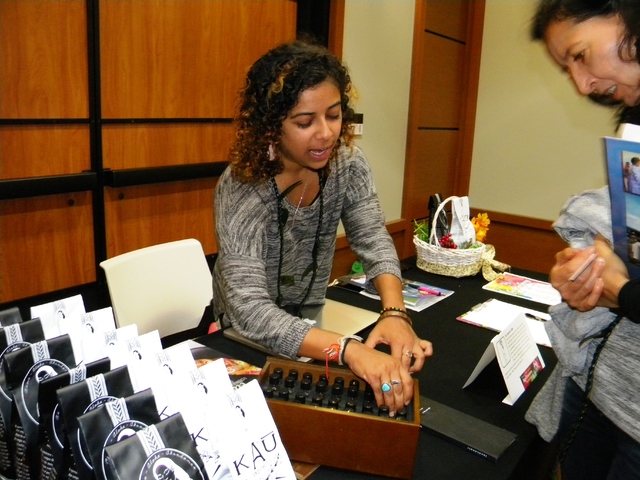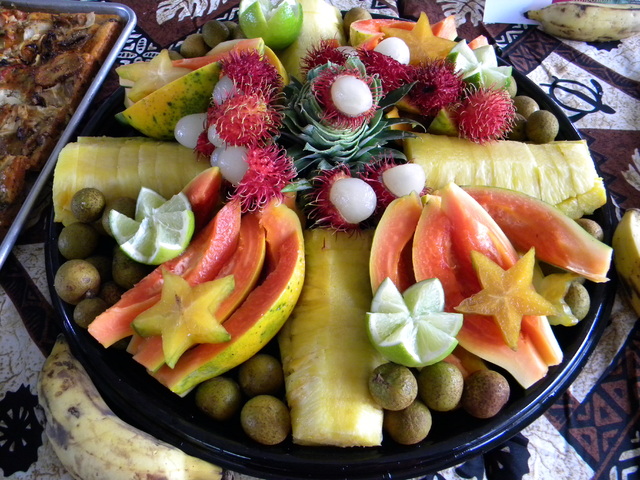HILO —Don’t let the lack of registration and regulation fool you. The Big Island has a thriving agricultural tourism industry, where visitors tour workplaces, sample everything from vanilla to chocolate to coffee to honey to mushrooms and visit the gift shop to buy value-added farm products.
HILO —Don’t let the lack of registration and regulation fool you. The Big Island has a thriving agricultural tourism industry, where visitors tour workplaces, sample everything from vanilla to chocolate to coffee to honey to mushrooms and visit the gift shop to buy value-added farm products.
Hawaii County has had an ordinance regulating agritourism since 2008. But so far, nobody has signed up.
Hawaii County Planning Director Duane Kanuha explained the problem to a group of about 100 at the first-ever International AgriTourism Symposium, held Saturday in Hilo.
The county ordinance regulates the percentage of revenues that can come from the tourism component compared to the agricultural component of operations, the hours of operation, traffic control and other issues associated with running a business on agricultural land.
“Obviously, it’s not happening because we haven’t had any applications,” Kanuha said, adding that state law also regulates commercial agricultural uses.
Counties can enact ordinances stricter than state laws, but not more lenient.
Maui County has no local law, said state Rep. Angus McKelvey, a Maui Democrat who’s chairman of the House Consumer Protection and Commerce Committee. He said changes to the state law are in the works, but they didn’t make it through the legislative session this year.
“Farmers were happy, and there were no complaints to our Planning Department,” McKelvey said.
Kanuha said government enforcement tends to be complaint-driven, and there are few if any complaints about the local businesses on the Big Island, either.
But Kohala Councilwoman Margaret Wille, who’s sponsoring a bill setting parameters for the agritourism businesses, said local laws would help strike a balance between the business operations and their neighbors. Wille’s latest bill is scheduled to be heard by the council Planning Committee at 1 p.m. Tuesday.
“If what’s being done in the Planning Department doesn’t comply with county law, then you risk a lawsuit,” said Wille, an attorney.
Other panelists at the symposium spoke of the increasing popularity of agritourism, as a new breed of tourist looks for “immersion travel,” to have real-life experiences at their destinations, not just engage in the conventional guided tours.
It’s especially important for Hawaii, said Frank Haas, a Honolulu marketing consultant with long experience in tourism marketing in both public and private sectors. Hawaii has special attractions that can’t be duplicated elsewhere, and they need to be capitalized on, he said.
“The same sun that shines in Hawaii shines in Cancun. …. We’re moving away from sun, sand, surf. We need to come to the part where we can’t substitute someplace else for Hawaii,” he said. “What is authentic? Authentic is what’s happening when the tourist isn’t there. People want to see the real place.”
The key to tourism with the newest travelers, and especially Japanese travelers, are the stories about a place, agreed fellow panelists Mitsue Varley, vice president for Hawaii Tourism Japan, and Andrew Te Whaiti, a tourism brand developer and former CEO of one of New Zealand’s largest tourism businesses.
“Energize the imagination of your visitors with world-class real experiences,” Te Whaiti advised.
The symposium was organized by the Hawaii AgriTourism Association with support from Hawaii County, the state Department of Agriculture, Kamehameha Schools Land Management Division, Big Island Visitors Bureau and Alii Kula Lavender. The daylong event was held at the University of Hawaii at Hilo’s Ka Haka Ula O Keelikolani College of Hawaiian Language.
In emphasizing the importance of sense of place in tourism, attendees shed their shoes before entering the hall. All attendees were draped with lei and offered fresh, locally grown food and drinks throughout the day.
“Throughout the years, I’ve learned that it’s not what you tell people, it’s how you make them feel,” Lani Weigert, executive director of the Hawaii AgriTourism Association, said in opening remarks. “Indeed, our successes in the agritourism industry comes from sharing experiences and stories with our residents and guests that keep them coming back.”


